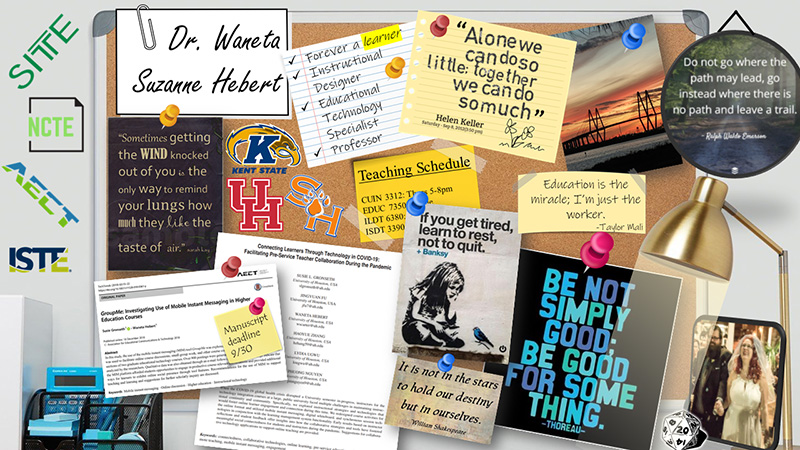“Do not go where the path may lead, go instead where there is no path and leave a trail.”—Ralph Waldo Emerson
At the end of my last synchronous online meeting of CUIN 3312: Educational Technology, one of my students commented that I am Superwoman for teaching their class while teaching full time and working on my doctorate. I personally don’t think I am Superwoman, but I am probably crazy. This has been a… busy semester, to say the least.

I knew what I was getting myself into when I started. I thought long and hard about whether to continue teaching at the University of Houston once I started my own doctoral classes, and ultimately decided that I just could not give up teaching that class. Teaching CUIN 3312 is the highlight of my week every week. It’s my favorite part of my busy schedule, and there was no way I would give it up. So, I knew coming into this semester that I would be one busy beaver, teaching at UH and teaching eighth grade English and completing two doctoral classes all at the same time. I did step down as department chair because even I have limitations, and I didn’t feel I could commit to the amount of extra time the position required in order to do it well. I probably could have made it happen if I needed to, but I knew that I would not be as good of a leader for my department with all my extra responsibilities.
Of course, I did not anticipate the pandemic. (Who did?) I did not know how different and how impossible my job as an eighth grade English teacher was going to be this semester. I received my acceptance email to Sam Houston State University on March 5th, just weeks before the pandemic lockdowns began. I have thought numerous times about whether or not I would have stuck with starting the program this year or if I would have postponed my doctoral plans for another year if I’d had the foreknowledge of what this semester was going to be like. And if I’m being perfectly honest with myself, I don’t think I would have changed it. What can I say? I’m stubborn. I mean, determined.
And so here I am, once again sitting in front of the post editor on my blog and reflecting on what I’ve learned over the past fifteen weeks of classwork. It’s been more than two years since I last did this, and yet it doesn’t feel like it’s been that long. I know that I am just one of those people that is as comfortable as a student as I am a teacher. Even in the two years between completing my M.Ed. and beginning my Ed.D., I never stopped learning.
Group Work at the Doctoral Level
“Alone we can do so little; together we can do so much.”—Helen Keller
There are a lot of differences about this program from my master’s program. The first being that it’s a cohort model. I wasn’t sure exactly what to expect; I interacted with far more other learners throughout my master’s classes than the nine other members of the cohort. Yet, I do not believe that I interacted as deeply across six semesters as I have with my cohort in this one semester. I was initially shocked at the amount of group work involved in both courses. Across the past fifteen weeks, I was able to work on some project or another with each member of the cohort save one. I’ve built connections and friendships, and I’m honestly looking forward to continuing these relationships through the rest of the program.
I actually changed my view and beliefs about group work in higher education because of what I’ve learned this semester. I created this short reflective video for one of my two classes, and it feels appropriate to include here. I think everyone has had negative experiences with working on a team; as educators and designers of learning, it’s up to us to use the lessons learned from those negative experiences along with the established theories of learning to create experiences for our learners where group work is an advantage to learning and not a stressor.
Reflective video, created for ISDT 7352: Instructional Planning
Professional Learning Problem: Who Would Choose Me?
At the end of the semester, one professor proposed the question, “If you had a professional learning problem to solve and you could choose only one other person in this cohort to be on your team, who would you choose? Do you think most of your peers would choose you for their team?” To be honest, depending on the problem, I would choose just about anyone in the cohort. One of the great things about our cohort is the variety of backgrounds and experiences we each have. Some have backgrounds in K–12 education, some in the private sector, and some in higher education. We range from late twenties to retirement. We each have our own strengths and weaknesses, so which member of my cohort I would select for my team would depend on my problem.
The next part of the question, though, is a little more tricky. Who would choose me? I hope that everyone in my cohort would choose me, if my skills aligned with their problem. I believe I’ve proven myself as a dedicated worker, though I know my dedication can sometimes come off a little pushy—and okay, when I say dedication, I mean my obsessive perfectionism. I don’t give any assignment or any task anything less than my best. I think that makes me a good member of any team, even if it can sometimes be… annoying.
“Be not simply good; be good for something.”—Henry David Thoreau
Creating a Vision Board
At the start of the semester, we were tasked with creating a vision board, and I’ll be honest, I did roll my eyes at the task. But like I said, perfectionist, so I made the best vision board I could. I envisioned it as my bulletin board five or ten years in the future, decorated with the artifacts from my life, like my wedding picture, along with items that I think I would have on a bulletin board in the future, like a teaching schedule or a reminder on a post-it of a manuscript deadline. It seemed a silly task at first, but it ended up being cathartic to look at the things I’ve already accomplished, like my two publications, and think about all the things I will accomplish in the future.

We’ve been encouraged to modify the board, but honestly, I love it the way it is. I’ve come back to it a couple times since I created and turned it in, and each time it has served as an important reminder of what I am capable of and a nudge of motivation to keep me going.
“Sometimes getting the wind knocked out of you is the only way to remind your lungs how much they like the taste of air.”—Sarah Kay
I’ve learned a lot this semester, and I’m looking forward to continuing my journey to becoming Dr. Waneta Hebert. There was much that was refresher to me, like the project that took us through the instructional design process, and there was much that was new, like the Four O’Clock Faculty book club (mentioned in my post here). I have not yet followed through on my own goal to host a jam session for professional development, and I lay the blame solely on the veritable crapstorm that has been this year of pandemic “hybrid” teaching.
I can’t help but cringe at the irony that the same reasons this year is a terrible one to try a new professional development style are the same reasons that a new professional development style is needed. I’ve spent much of this semester frustrated that I haven’t been able to apply what I’ve been learning as much as I would under normal circumstances.
I have a better understanding of why this year has been so difficult for all the learning I’ve done, even if it doesn’t feel like I’ve made the year any easier. I highlighted whole sections of the textbook Introduction to Systemic Instructional Design for Traditional, Online, and Blended Environments that talk about the necessary qualities for both learners and instructors of online learning, qualities that most eighth graders do not have and qualities that not all teachers have. I don’t mean this in a derogatory way; it’s simply a fact. When we signed up to be teachers, we didn’t sign up for all that this year would bring. Even with my background and education in online learning, I have not been as effective as a teacher this year. Middle school students barely know how to be students; they can’t blow their noses without explicit permission, so of course they don’t all know how to be effective online students. And honestly, there’s only so much we can teach; many of the qualities that make a learner effective online are internal. We’re all doing the best we can, we’re learning lesson after lesson from the experience, and we’ll be better for it in the end.
“If you get tired, learn to rest, not to quit.”—Banksy
This reflection wraps up the semester for me, and I am certainly looking forward to next semester. But before that, it is time to rest. It is time to bake Christmas cookies. It is time to read trashy novels about vampires. It is time to take my Sims on a snowboarding vacation, the only kind of vacation that is currently safe. By the time next semester starts, I’ll be recharged and ready to open up my brain once again, one step closer to being Dr. Hebert.
Originally published on Mrs. Hebert’s Classroom on December 6, 2020.
Looking for professional development resources? Check out the Infobase Learning Cloud.
See also:



